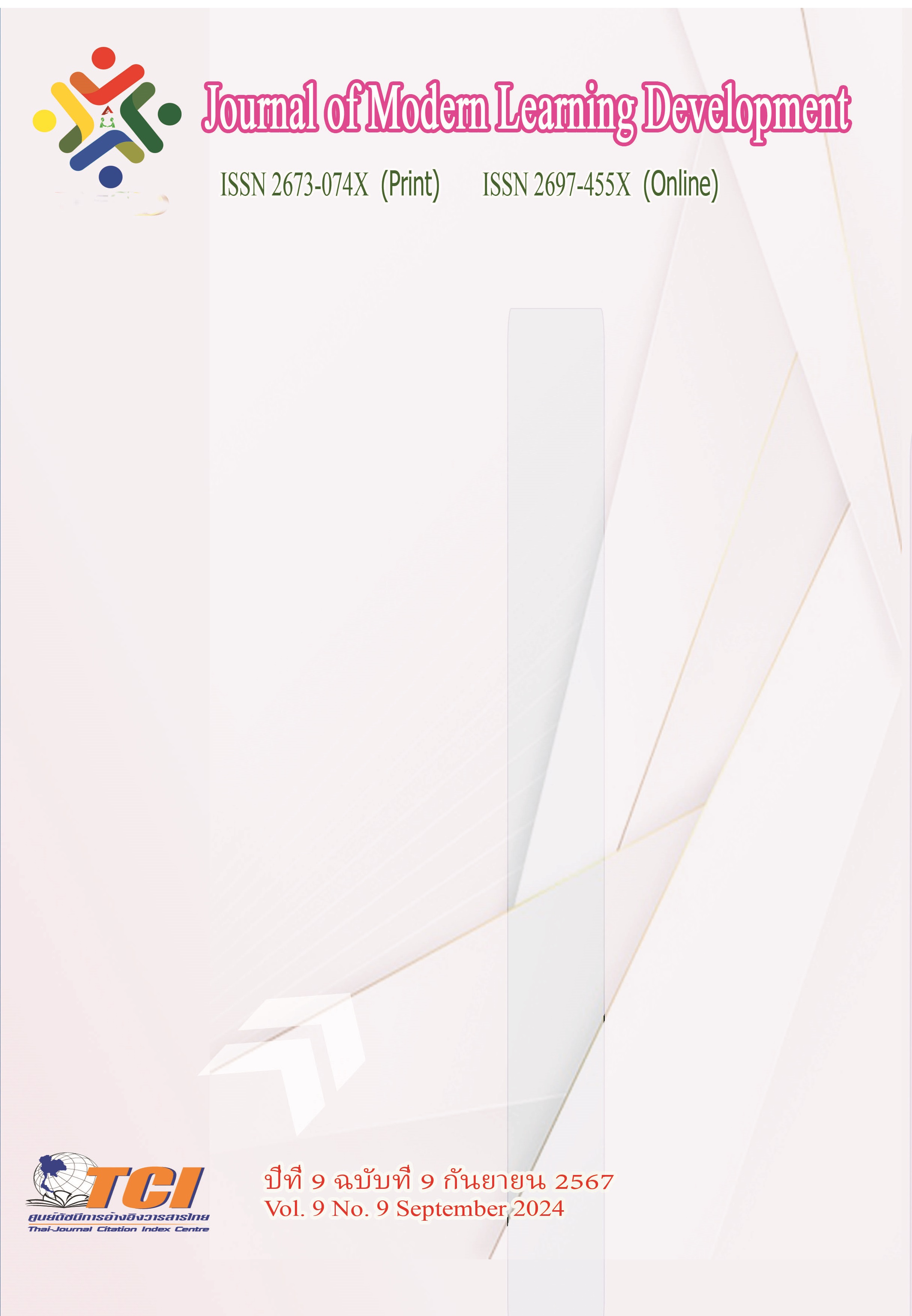Technology Acceptance Affecting Work Effectiveness of Personnel at a Hospital
Main Article Content
Abstract
This study aims to investigate the acceptance of technology and the efficiency of work among personnel in a specific hospital. The objective is to compare individual factors with the work efficiency of hospital staff and examine how technology acceptance influences their work efficiency. The sample group for this study consists of 286 hospital personnel, and a questionnaire is utilized as the data collection tool. Statistical analyses include percentages, averages, standard deviations, T-test, ANOVA, and regression. The results of the study reveal that the conclusions of this study highlight the importance of technology adoption and adaptation to new technology to increase the work efficiency of hospital personnel. This will have a positive impact on health services and the quality of life of the people who use the services in the said hospital. In addition, the study is also useful in developing policies and guidelines for effective and efficient human resource management in public health organizations and quality.
Article Details
References
กรมควบคุมโรค. (2564). รัฐบาลขอความร่วมมือทุกหน่วยงาน “Work from Home” หลังสงกรานต์. ออนไลน์. สืบค้นเมื่อ 3 มีนาคม 2567. แหล่งที่มา: https://pr.moph.go.th/?url=pr/detail/ 2/04/156690/
กัตตกมล พิศแลงาม. (2565). ปัจจัยการยอมรับเทคโนโลยีการทำธุรกรรมทางการเงินผ่านไทยคิวอาร์เพย์เม้นท์ ของประชาชนในจังหวัดปทุมธานี. วารสารสารสนเทศ. 21 (1),1-12.
กันยปริณ ทองสามสี และ คณน ไตรจันทร์. (2557). กรอบแนวความคิดการศึกษาปัจจัยที่ส่งผลต่อสมรรถนะการปฏิบัติงาน. วารสารวิทยาการจัดการ. 31 (1),169-187.
ธนวัฒน์ เดชปรอท. (2563). การศึกษาความเปลี่ยนแปลงของเทคโนโลยีและนวัตกรรม ที่ส่งผลกระทบต่อธุรกิจการบริการด้านคมนาคม. วารสารวิชาการวิศวกรรมโยธาแห่งชาติ. 25 (1),1-8.
บุญชม ศรีสะอาด. (2560). การวิจัยเบื้องต้น. กรุงเทพมหานคร: สุวีริยาสาส์น.
พรรณทิพา แอดำ. (2549). การยอมรับเทคโนโลยีสารสนเทศ ของข้าราชการสำนักงานปลัดกระทรวงพลังงาน. ชลบุรี: มหาวิทยาลัยบูรพา.
พราวแพรวสิริรัตน์ พงศ์พันธ์ และคณะ. (2565). เทคโนโลยีดิจิทัล HR กับประสิทธิภาพในการทำงานของพนักงานทรัพยากรบุคคล. วารสารสังคมศาสตร์ปัญญาพัฒน์. 4 (4), 27-40.
ภัคกมล ใจมา. (2563). การยอมรับและการใช้เทคโนโลยีที่ส่งผลต่อประสิทธิภาพในการปฏิบัติงานของข้าราชการและพนักงานองค์กรปกครองส่วนท้องถิ่นในเขตอำเภอเมืองเชียงใหม่. กรุงเทพมหานคร: มหาวิทยาลัยรามคำแหง
รวิสรา ชัยประภา, และปรียานุช อภิบุณโยภาส. (2565). คุณภาพชีวิตการทำงานและปัจจัยส่วนบุคคลที่ส่งผลต่อประสิทธิภาพการทำงาน ของพนักงานขับรถขนส่งน้ำมันในเขตภาคตะวันออก. วารสารวิชาการมหาวิทยาลัยการจัดการและเทคโนโลยีอีสเทิร์น. 19 (1), 1-19.
ราชกิจจานุเบกษา. (2564). การประกาศเคอร์ฟิวตั้งแต่วันที่ 3 เมษายน 2564 จนถึงวันที่ 13 มิถุนายน 2564. เล่ม 138 ตอนพิเศษ 102 ง หน้า 1-2. กรุงเทพมหานคร: ราชกิจจานุเบกษา.
วณิชยา ใจเร็ว, ดวงรัตน์ เหลืองอ่อน และ คณิติน จรโคกกรวด. (2566). โมเดลความสัมพันธ์เชิงสาเหตุการยอมรับเทคโนโลยีสำหรับการสอนออนไลน์ของครูในช่วงแพร่ระบาดของโควิด-19. Journal of Modern Learning Development. 8 (5),31-48.
สมพงศ์ รัตนนุพงศ์. (2558). คุณภาพชีวิตในการทำงานกับประสิทธิภาพการปฏิบัติงานของพนักงานศูนย์ข่าว SMM. กรุงเทพมหานคร: มหาวิทยาลัยธรรมศาสตร์.
สุทิพย์ ประทุม และ สรัญณี อุเส็นยาง. (2565). การยอมรับเทคโนโลยีสารสนเทศในยุควิถีชีวิตใหม่. วารสารลวะศรี มหาวิทยาลัยราชภัฏเทพสตรี. 6 (1),1-18.
Aida, G., & Ulviyya, R. (2024). Evaluation of an English language skills development project for high school students. Journal of Modern Thai Education. 31 (2), 1-15.
Azaria, A., & Ariel, E. (2016). Medrec: Using blockchain for medical data access and permission management. In 2016 2nd international conference on open and big data (OBD), 25.30.
Davis, F. D. (1989). Perceived usefulness, perceived ease of use, and user acceptance of information technology. MIS quarterly, 319-340.
Peterson, E., & Plowman, G.E. (1953). Business organizational and management. Illinois: Irwin.
Taro, Y. (1973). Statistics: an introductory analysis. New York: Harper. & Row.


